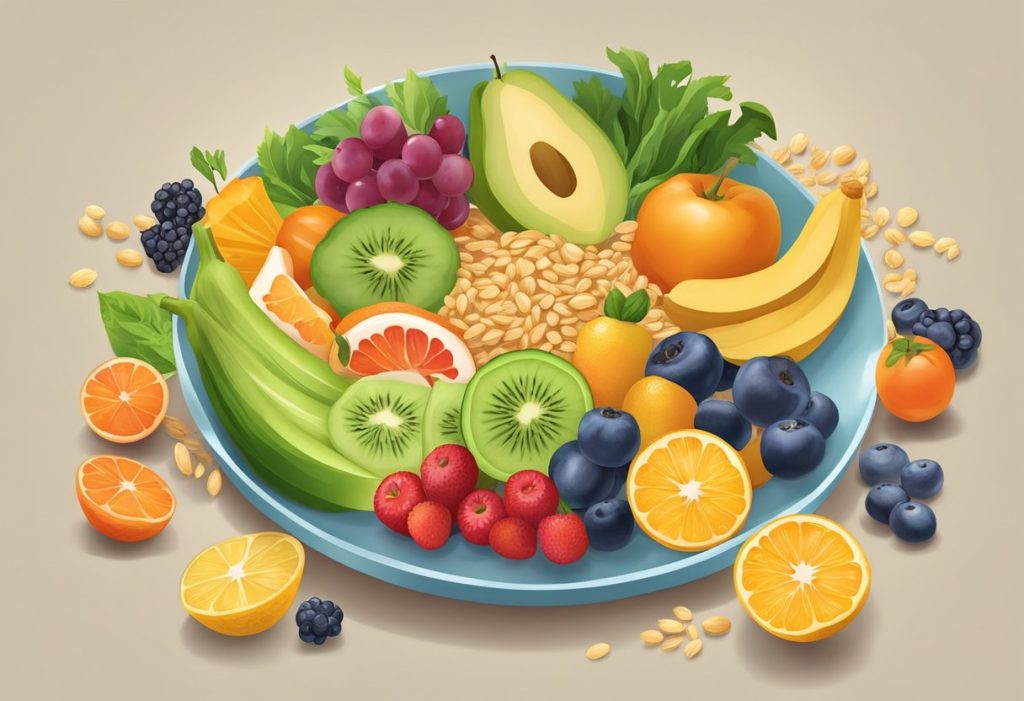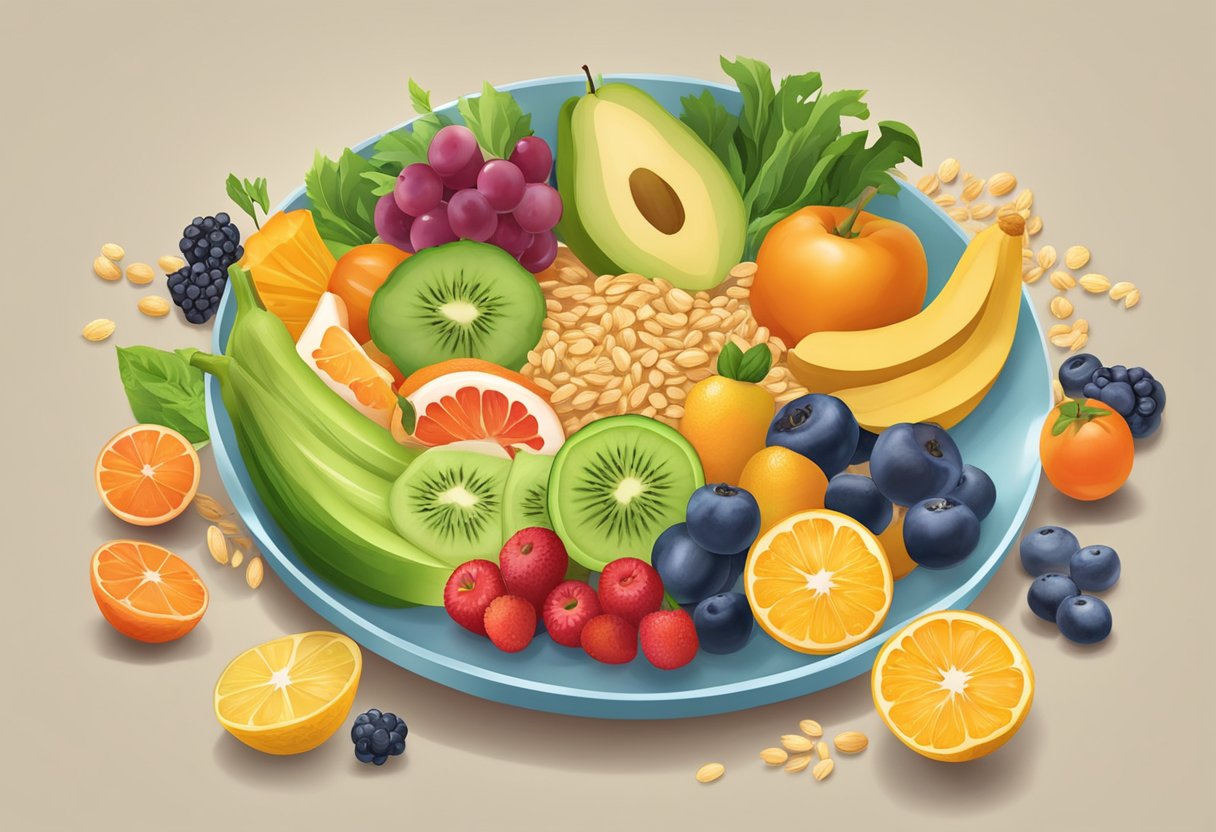Healthy eating is a crucial component of a healthy lifestyle. Eating a balanced diet can help individuals maintain a healthy weight, reduce the risk of chronic diseases, and improve overall well-being. A balanced diet includes a variety of nutrient-dense foods that provide essential vitamins, minerals, and other nutrients necessary for good health.

Understanding healthy eating is essential for anyone looking to improve their diet. A healthy diet includes a variety of foods from all food groups, including fruits, vegetables, whole grains, lean proteins, and healthy fats. It is important to limit processed and high-fat foods, as well as sugary drinks and snacks, which can contribute to weight gain and other health problems.
Key Takeaways:
- A balanced diet is essential for maintaining good health and reducing the risk of chronic diseases.
- A healthy diet includes a variety of nutrient-dense foods from all food groups.
- Limiting processed and high-fat foods, as well as sugary drinks and snacks, is important for maintaining a healthy weight and reducing the risk of health problems.
Understanding Healthy Eating
Healthy eating is all about consuming a balanced diet that provides all the necessary nutrients to the body. It is not just about eating less or avoiding certain foods, but rather about making healthier choices that can help maintain a healthy weight and prevent chronic diseases.
A balanced diet typically includes a variety of foods from the five main food groups: fruits, vegetables, grains, proteins, and dairy. Each group provides essential nutrients such as vitamins, minerals, fiber, and protein that the body needs to function properly.
It is important to note that portion control is also a crucial aspect of healthy eating. Consuming too much of any food, even healthy ones, can lead to weight gain and other health issues. Therefore, it is recommended to eat in moderation and maintain a healthy balance of all food groups in each meal.
In addition to eating a balanced diet, there are other tips that can help maintain a healthy lifestyle. These include drinking plenty of water, limiting processed and sugary foods, and avoiding excessive alcohol consumption.
Overall, healthy eating is about making informed choices and maintaining a balanced diet that provides all the necessary nutrients to the body. By following these tips, individuals can improve their overall health and reduce the risk of chronic diseases.
The Importance of a Balanced Diet
Eating a balanced diet is one of the most important things you can do to maintain good health. A balanced diet is one that includes a variety of foods from all the food groups in the right proportions. This means eating a diet that is rich in fruits, vegetables, whole grains, lean protein, and healthy fats.
A balanced diet supplies the fuel your body needs to work effectively. Without balanced nutrition, your body is more prone to illnesses such as heart disease, diabetes, and cancer. Eating a balanced diet can help you maintain a healthy body weight, reduce the risk of chronic diseases, and improve your overall quality of life.
To achieve a balanced diet, it is important to eat a variety of foods from each food group. The following table provides a breakdown of the recommended daily intake of each food group based on a 2,000 calorie diet:
| Food Group | Daily Servings |
|---|---|
| Fruits | 2 cups |
| Vegetables | 2.5 cups |
| Grains | 6 ounces |
| Protein | 5.5 ounces |
| Dairy | 3 cups |
It is also important to limit the intake of foods that are high in saturated fats, trans fats, cholesterol, sodium, and added sugars. These foods can contribute to chronic diseases such as heart disease, diabetes, and high blood pressure.
In addition to eating a balanced diet, it is important to stay hydrated by drinking plenty of water throughout the day. Water is essential for maintaining the body’s functions, and it can also help you feel full and avoid overeating.
Overall, a balanced diet is essential for maintaining good health and preventing chronic diseases. By eating a variety of foods from each food group in the right proportions, you can ensure that your body is getting the nutrients it needs to function properly.
Components of a Balanced Diet

A balanced diet is essential for maintaining good health. It consists of a variety of foods that provide the body with the necessary nutrients to function properly. The components of a balanced diet include macronutrients, micronutrients, fiber, and water.
Macronutrients
Macronutrients are the nutrients that the body needs in large amounts. They include carbohydrates, proteins, and fats. Carbohydrates are the primary source of energy for the body. They are found in foods such as bread, rice, pasta, and fruits. Proteins are essential for building and repairing tissues, and they are found in foods such as meat, fish, beans, and nuts. Fats are essential for maintaining healthy skin and hair, and they are found in foods such as nuts, seeds, and oils.
Micronutrients
Micronutrients are the nutrients that the body needs in small amounts. They include vitamins and minerals. Vitamins are essential for maintaining good health, and they are found in foods such as fruits, vegetables, and dairy products. Minerals are essential for maintaining strong bones and teeth, and they are found in foods such as meat, fish, and dairy products.
Fiber
Fiber is essential for maintaining good digestive health. It helps to regulate bowel movements and prevent constipation. Fiber is found in foods such as fruits, vegetables, whole grains, and legumes.
Water
Water is essential for maintaining good health. It helps to regulate body temperature, transport nutrients throughout the body, and remove waste products from the body. It is recommended that adults drink at least 8 glasses of water per day.
In conclusion, a balanced diet consists of a variety of foods that provide the body with the necessary nutrients to function properly. It includes macronutrients, micronutrients, fiber, and water. By following a balanced diet, individuals can maintain good health and prevent chronic diseases.
Practical Tips for Healthy Eating
Maintaining a balanced diet can be challenging, but it is essential for good health. Here are some practical tips for healthy eating:
Meal Planning
Planning meals in advance can help ensure that you eat a balanced diet. Consider the following tips when meal planning:
- Plan meals around nutrient-dense foods, such as fruits, vegetables, whole grains, lean proteins, and healthy fats.
- Make a grocery list to ensure that you have all the ingredients you need for your meals.
- Cook meals in bulk and freeze leftovers for quick and easy meals later on.
- Use a slow cooker or pressure cooker to save time and energy.
Healthy Snacking
Snacking can be a healthy way to curb hunger and provide energy between meals. Consider the following tips for healthy snacking:
- Choose snacks that are nutrient-dense, such as fruits, vegetables, nuts, and seeds.
- Avoid snacks that are high in added sugars, saturated fats, and sodium.
- Portion out snacks in advance to avoid overeating.
Portion Control
Portion control is essential for maintaining a balanced diet. Consider the following tips for portion control:
- Use smaller plates, bowls, and cups to help control portions.
- Measure out serving sizes to avoid overeating.
- Avoid eating straight from the package, as it can be easy to overeat.
Mindful Eating
Mindful eating involves paying attention to the food you are eating and the sensations you are experiencing while eating. Consider the following tips for mindful eating:
- Eat slowly and savor each bite.
- Avoid distractions, such as watching TV or using your phone while eating.
- Pay attention to hunger and fullness cues to avoid overeating.
By following these practical tips, you can maintain a balanced diet and improve your overall health.
Overcoming Challenges to Healthy Eating
Maintaining a healthy diet can be challenging, especially with the abundance of unhealthy food options available. However, with the right mindset and strategies, anyone can overcome these challenges and achieve a balanced diet. Here are some tips for overcoming common challenges to healthy eating:
1. Lack of Time
Many people struggle to find the time to prepare healthy meals, especially with busy work schedules and other commitments. One solution is to plan meals in advance and prepare them in batches, so that healthy meals are always readily available. Meal delivery services and pre-packaged healthy meals can also be a convenient option for those with busy schedules.
2. Limited Budget
Eating healthy doesn’t have to be expensive. In fact, many healthy foods are affordable and readily available. Eating in-season fruits and vegetables, buying in bulk, and shopping at discount grocery stores are all ways to save money on healthy foods. Planning meals in advance and avoiding eating out can also help save money.
3. Cravings for Unhealthy Foods
Cravings for unhealthy foods can be a major obstacle to healthy eating. One strategy is to allow for occasional indulgences while still maintaining a balanced diet overall. Another strategy is to find healthy alternatives to unhealthy foods, such as swapping out chips for roasted chickpeas or replacing sugary drinks with flavored water.
4. Lack of Knowledge
Many people struggle with knowing what foods are healthy and how to prepare them. Doing research, reading nutrition labels, and consulting with a registered dietitian can all help improve knowledge about healthy eating. Additionally, cooking classes and healthy eating workshops can be a fun and informative way to learn more about healthy eating.
5. Social Pressure
Social pressure to eat unhealthy foods can be difficult to resist, especially in social situations. One strategy is to communicate with friends and family about the importance of healthy eating and enlist their support. Bringing healthy snacks to social events can also help resist the temptation of unhealthy foods.
Overall, with the right mindset and strategies, anyone can overcome challenges to healthy eating and achieve a balanced diet.
Conclusion
In conclusion, maintaining a balanced diet is essential for a healthy lifestyle. A balanced diet involves consuming a variety of foods from different food groups, including whole grains, fruits, vegetables, lean proteins, healthy fats, and low-fat dairy products.
It is important to note that a balanced diet is not a one-size-fits-all approach. Each person’s nutritional needs may vary based on age, gender, weight, and activity level. Therefore, it is recommended to consult with a registered dietitian or healthcare professional to develop a personalized nutrition plan.
Incorporating healthy eating habits into one’s lifestyle can have numerous benefits, including weight management, improved energy levels, better sleep, and reduced risk of chronic diseases such as heart disease, diabetes, and cancer.
It is also important to practice mindful eating habits, such as eating slowly, listening to hunger and fullness cues, and avoiding distractions while eating. This can help prevent overeating and promote a healthy relationship with food.
Overall, a balanced diet and healthy eating habits are crucial for maintaining optimal health and well-being. By making small changes to one’s diet and lifestyle, one can achieve long-term health benefits.
Frequently Asked Questions
What are the benefits of a balanced diet?
Eating a balanced diet has numerous benefits for overall health and wellbeing. A balanced diet can help maintain a healthy weight, reduce the risk of chronic diseases such as heart disease and diabetes, improve brain function, and boost energy levels. A balanced diet can also improve digestion, strengthen the immune system, and promote healthy skin and hair.
What are some simple tips for eating healthy?
Eating healthy doesn’t have to be complicated. Some simple tips for eating healthy include choosing whole, unprocessed foods, eating a variety of fruits and vegetables, limiting sugary and fatty foods, and staying hydrated by drinking plenty of water. It’s also important to pay attention to portion sizes and to listen to your body’s hunger and fullness cues.
What are the top 10 healthy foods?
There are many healthy foods to choose from, but some of the top 10 include leafy greens such as spinach and kale, berries like blueberries and strawberries, fatty fish like salmon and tuna, nuts and seeds, whole grains like quinoa and brown rice, and cruciferous vegetables like broccoli and cauliflower. Other healthy foods include avocados, sweet potatoes, and legumes like beans and lentils.
How can I eat healthy on a budget?
Eating healthy on a budget is possible with some planning and preparation. Some tips for eating healthy on a budget include buying in-season produce, buying in bulk, choosing frozen fruits and vegetables, and planning meals ahead of time. It’s also important to compare prices and shop around for the best deals, and to consider buying store-brand items instead of name-brand products.
What nutrients should be included in a balanced diet?
A balanced diet should include a variety of nutrients from all of the food groups. These nutrients include protein, carbohydrates, healthy fats, fiber, vitamins, and minerals. It’s important to choose nutrient-dense foods like fruits and vegetables, whole grains, lean proteins, and healthy fats to ensure that you’re getting all of the nutrients your body needs.
What are some tips for maintaining good health?
Maintaining good health involves more than just eating a balanced diet. Other tips for maintaining good health include getting regular exercise, getting enough sleep, managing stress, staying hydrated, and avoiding harmful habits like smoking and excessive alcohol consumption. It’s also important to stay up-to-date with regular health check-ups and screenings.

